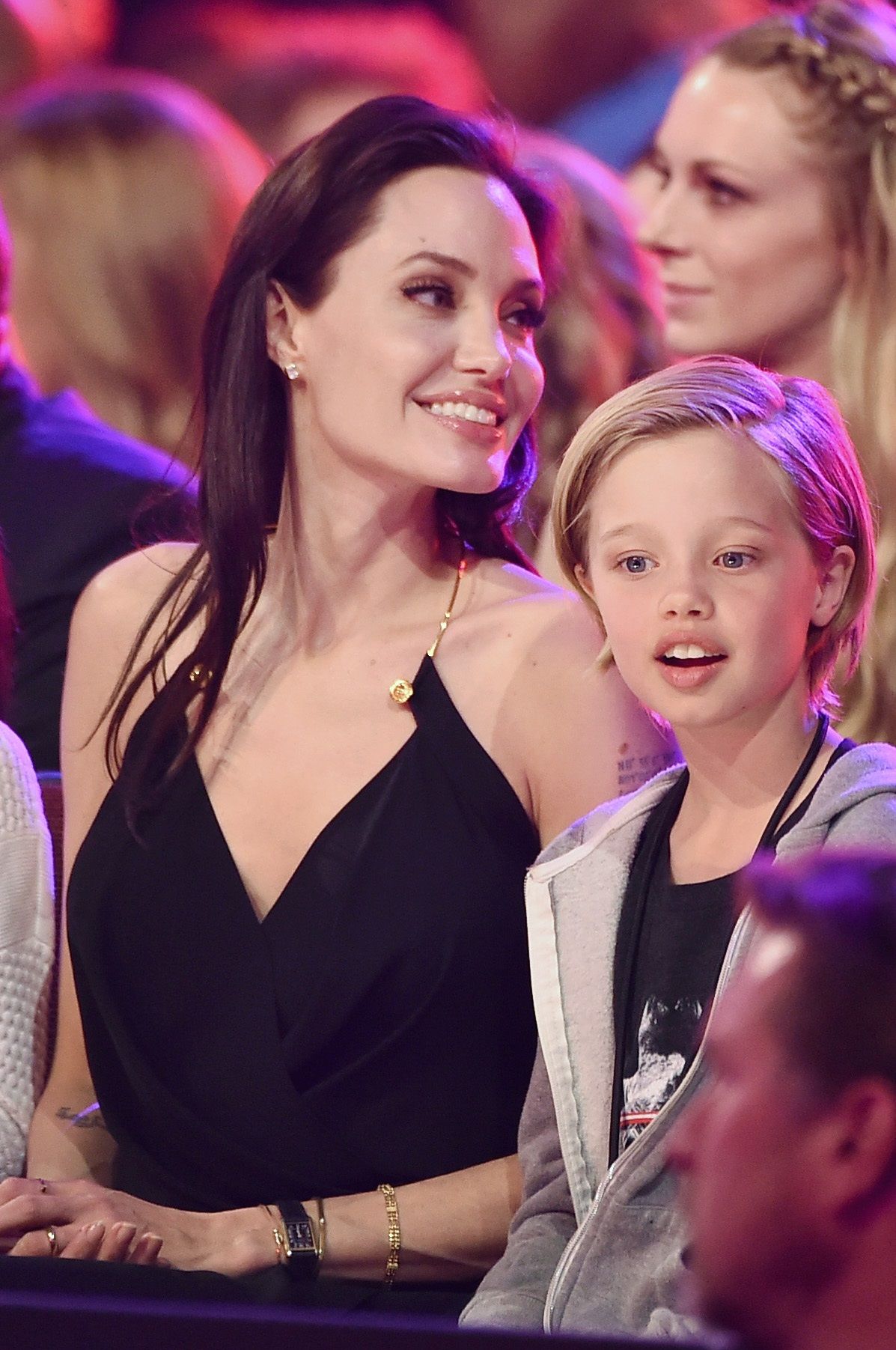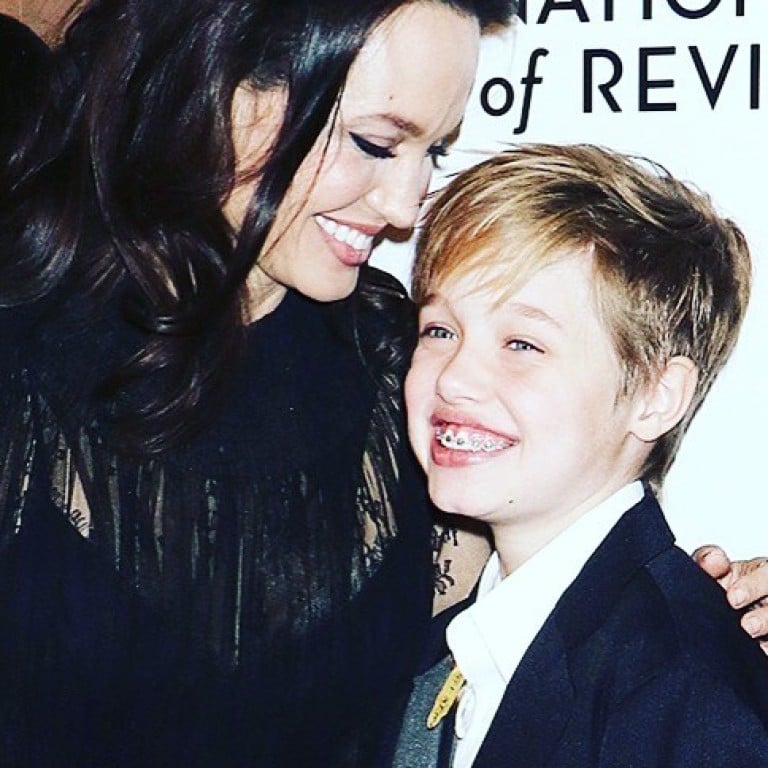Shiloh Jolie Pitt: From Boy To Girl? Untold Story!
Can a child truly know themselves from the earliest years? Shiloh Jolie-Pitt's story, marked by early explorations of gender and a later assertion of independence, continues to fascinate and spark conversations about identity, family, and growing up in the spotlight.
From a young age, Shiloh's journey has been anything but ordinary. Born into Hollywood royalty to Angelina Jolie and Brad Pitt, her early childhood was characterized by a freedom of expression rarely afforded to children in the public eye. Jolie, in a 2010 interview with Vanity Fair, openly shared that Shiloh had been exploring her gender identity since the age of three. "She wants to be a boy," Jolie stated, a sentiment that was echoed in various media outlets at the time. This declaration ignited a media frenzy, with many scrutinizing the child's clothing choices, hairstyles, and overall presentation. While some applauded Jolie and Pitt for their acceptance and support, others questioned the narrative being constructed around a child who was still developing her sense of self.
| Category | Information |
|---|---|
| Full Name | Shiloh Nouvel Jolie-Pitt |
| Date of Birth | May 27, 2006 |
| Place of Birth | Swakopmund, Namibia |
| Parents | Angelina Jolie and Brad Pitt |
| Siblings | Maddox Chivan Jolie-Pitt, Pax Thien Jolie-Pitt, Zahara Marley Jolie-Pitt, Knox Lon Jolie-Pitt, Vivienne Marcheline Jolie-Pitt |
| Known For | Public figure, daughter of Angelina Jolie and Brad Pitt |
| Early Expression | Expressed desire to be called "John" and dress in traditionally masculine clothing in early childhood. |
| Recent Developments | Filed to drop "Pitt" from her last name in 2024. |
| Reference Link | People.com - Shiloh Jolie-Pitt Files to Legally Drop Brad Pitt From Her Last Name |
The Jolie-Pitt's approach to parenting, particularly concerning Shiloh, was often highlighted as an example of acceptance. They allowed Shiloh to express herself authentically, even if it meant defying societal norms. Reports circulated that Shiloh preferred to be called "John" and gravitated towards traditionally masculine clothing. Rather than pushing her into stereotypical gender roles, Jolie and Pitt seemingly embraced her individuality, acknowledging her affinity for her brothers' interests and styles.
- Bumpy Johnson The Real Story Behind Harlems Godfather
- Frank Gallaghers Death Exploring The Shameless Finale Legacy
However, as Shiloh matured, the narrative shifted. The once ubiquitous "boy" label seemed to fade, and Shiloh began to embrace aspects of traditionally feminine expression. She grew her hair longer, experimented with different styles, and appeared to navigate the complexities of adolescence in her own way. This transition led some to conclude that her earlier gender exploration was simply a phase, a temporary detour on the path to self-discovery. This perspective, while comforting to some, risks minimizing the significance of Shiloh's earlier experiences and the genuine feelings she expressed. It's crucial to remember that identity is fluid and evolving, and a child's exploration of gender, regardless of where it leads, should be treated with respect and understanding.
The complexities of Shiloh's journey are further compounded by the very public nature of her parents' separation and subsequent legal battles. Angelina Jolie and Brad Pitt's divorce has been a protracted and acrimonious affair, with the custody of their six children remaining a central point of contention. The emotional toll of such a high-profile and deeply personal conflict on the children is undeniable. It is within this context of family upheaval that Shiloh's recent decision to drop "Pitt" from her last name must be understood.
In May 2024, shortly after her 18th birthday, news broke that Shiloh had filed legal documents to officially change her name to Shiloh Jolie. This decision, described by her attorney as "an independent and significant decision following painful events," sent shockwaves through the media. While the specific "painful events" remain undisclosed, the timing of the filing, coinciding with her newfound legal adulthood, suggests a desire to assert her autonomy and create a clearer separation from her father. Sources close to Brad Pitt reportedly indicated his disappointment with Shiloh's decision, highlighting the deep rifts that have formed within the family.
- The Untold Story Of Band Of Brothers Captain Sobel Fact Vs Fiction
- Leo Virgo Cusp Are You One Traits Compatibility More
Shiloh's choice to distance herself from her father's name is not an isolated incident within the Jolie-Pitt family. Several of her siblings have also taken steps to publicly disassociate themselves from Brad Pitt, either by dropping "Pitt" from their names or expressing strained relationships with him. These actions paint a picture of a family deeply fractured by conflict, where the children have been caught in the crossfire of their parents' divorce. While the details of these familial dynamics remain largely private, the public actions of the Jolie-Pitt children offer a glimpse into the complex and challenging realities of growing up amidst parental discord.
The media's coverage of Shiloh's life, particularly her gender expression and her decision to drop her father's name, raises important ethical considerations. As a child of famous parents, Shiloh has been subjected to intense scrutiny from a young age. Her personal experiences, including her exploration of gender identity and her relationship with her parents, have been dissected and debated in the public sphere. While the public has a natural curiosity about the lives of celebrities and their children, it is essential to recognize the potential harm that can be caused by excessive media attention and speculation. Children, regardless of their parents' fame, deserve the right to privacy and the freedom to develop their identities without undue pressure or judgment.
The focus on Shiloh's gender expression also highlights the evolving understanding of gender identity and the importance of creating a more inclusive and accepting society. While some may view her earlier desire to be a boy as a "phase," it is crucial to acknowledge that gender identity is a complex and personal experience. Some individuals may identify with the gender they were assigned at birth, while others may identify as a different gender or as non-binary. There is no one "right" way to experience gender, and it is essential to respect and support individuals as they explore and express their own identities.
Furthermore, the media's portrayal of Shiloh's story can contribute to broader societal conversations about gender stereotypes and expectations. By showcasing a child who defied traditional gender norms, Jolie and Pitt challenged the rigid definitions of masculinity and femininity. Their willingness to accept and support Shiloh's choices, even when they differed from societal expectations, served as a powerful example of unconditional love and acceptance. While not every parent may agree with their approach, the Jolie-Pitt's story can encourage families to create a safe and supportive environment where children feel empowered to express themselves authentically, regardless of their gender identity or expression.
Ultimately, Shiloh Jolie-Pitt's story is a reminder that growing up is a complex and multifaceted process, particularly for those who are raised in the public eye. Her experiences with gender exploration, family conflict, and the pressures of fame have shaped her into the young woman she is today. As she embarks on adulthood, Shiloh has the opportunity to define her own narrative and forge her own path, independent of the expectations and judgments of others. Her journey, though unique and challenging, offers valuable lessons about identity, family, and the importance of embracing one's authentic self.
The narratives surrounding children of celebrities are often fraught with speculation and judgment. We see this played out not only in Shiloh's story but also in the experiences of other young people navigating gender identity in the public eye. Charlize Theron, Jamie Lee Curtis, and Gabrielle Union have all openly discussed their approaches to parenting and supporting their children's gender exploration. These celebrity stories, while offering visibility, also raise complex questions about privacy, parental roles, and the ethics of public discourse around children's identities.
It's crucial to acknowledge that the experiences of transgender and gender-nonconforming youth are diverse and often challenging. Many face discrimination, lack of access to supportive resources, and mental health disparities. Celebrity stories can help raise awareness and promote understanding, but it's vital to ensure that these narratives do not overshadow the experiences of everyday individuals and the systemic issues they face. Genuine allyship involves not only celebrating diverse identities but also advocating for policies and practices that promote equality and inclusion.
In the years since Jolie's initial interview with Vanity Fair, the conversation surrounding gender identity has evolved significantly. There's a greater understanding of the spectrum of gender and the importance of using correct pronouns and respecting individual identities. Parents, educators, and healthcare professionals are increasingly equipped with resources and knowledge to support transgender and gender-nonconforming youth. However, challenges remain, including misinformation, prejudice, and legislative attacks on transgender rights.
Shiloh Jolie-Pitt's journey is not representative of all transgender or gender-nonconforming individuals. Her experiences are unique to her circumstances, including her privileged background and access to resources. It's crucial to avoid generalizations and to recognize the diversity of experiences within the transgender community. Each individual's journey is personal and deserves respect and understanding.
As Shiloh continues to navigate adulthood, her choices will likely remain under public scrutiny. However, it's important to remember that she is an individual with agency and the right to make her own decisions. Whether she continues to embrace aspects of traditionally feminine expression or chooses a different path, her choices should be respected. The focus should be on supporting her well-being and allowing her to live authentically, free from the pressures and expectations of others.
The story of Shiloh Jolie-Pitt serves as a microcosm of larger societal conversations about gender identity, family dynamics, and the challenges of growing up in the spotlight. It's a reminder that identity is fluid and evolving, and that individuals deserve the freedom to explore and express themselves authentically. While the public's fascination with celebrity children is unlikely to wane, it's crucial to approach these narratives with empathy, respect, and a commitment to promoting understanding and inclusivity.
The ongoing divorce proceedings between Angelina Jolie and Brad Pitt add another layer of complexity to Shiloh's story. The legal battles and custody disputes have undoubtedly impacted the entire family, and the children have been caught in the middle of a highly publicized and acrimonious conflict. The emotional toll of such a situation can be significant, and it's essential to recognize the potential impact on Shiloh's well-being.
While the specific details of the divorce proceedings remain largely confidential, the public actions of the Jolie-Pitt children, including Shiloh's decision to drop her father's name, offer a glimpse into the strained relationships within the family. These actions suggest a desire to distance themselves from Brad Pitt and to assert their independence from the ongoing conflict. It's important to approach these developments with sensitivity and to avoid speculation about the underlying causes of the familial discord.
The media's coverage of the Jolie-Pitt divorce has often focused on the sensational aspects of the case, including accusations of abuse and allegations of parental alienation. However, it's crucial to remember that these are serious issues with potentially devastating consequences for the children involved. The focus should be on protecting the children's well-being and ensuring that their voices are heard in the legal proceedings.
Ultimately, the story of Shiloh Jolie-Pitt is a reminder that behind the headlines and the celebrity facade, there are real people with complex emotions and challenging experiences. It's important to approach these narratives with empathy, respect, and a commitment to promoting understanding and inclusivity. As Shiloh continues to navigate adulthood, her choices should be respected, and her well-being should be prioritized.
The initial reports suggesting Shiloh "thought she was a boy" were largely based on Jolie's statements in the 2010 Vanity Fair interview. However, it's important to interpret those statements within the context of a young child exploring their identity. Children often experiment with different roles and expressions, and it's crucial to avoid imposing adult understandings of gender identity onto their experiences.
The language used to describe Shiloh's gender expression has evolved over time. Initially, the term "tomboy" was often used, which is a gendered term that reinforces traditional stereotypes. As societal understanding of gender identity has grown, more inclusive and respectful language has emerged. It's important to use accurate and respectful language when discussing gender identity, and to avoid using terms that perpetuate stereotypes or misrepresent individual experiences.
The focus on Shiloh's physical appearance, particularly her hair length and clothing choices, is a common theme in media coverage of celebrity children. However, it's important to remember that physical appearance is not necessarily indicative of gender identity. Individuals can express their gender identity in a variety of ways, and physical appearance is just one aspect of that expression. It's crucial to avoid making assumptions about someone's gender identity based on their physical appearance.
The lack of definitive statements from Shiloh herself about her gender identity has fueled much of the speculation and debate surrounding her story. However, it's important to respect her privacy and to allow her to define her own narrative. She has the right to control how her story is told, and it's not appropriate to pressure her to disclose personal information that she is not comfortable sharing.
The influence of her parents' celebrity status on Shiloh's development is undeniable. Growing up in the public eye comes with unique challenges, including increased scrutiny, lack of privacy, and pressure to conform to societal expectations. It's important to recognize the impact of these factors on Shiloh's experiences and to avoid making judgments about her choices without understanding the context in which she has grown up.
The resources available to Shiloh, including access to therapists, stylists, and other professionals, are not available to all children exploring their gender identity. This highlights the disparities in access to care and support for transgender and gender-nonconforming youth. It's important to advocate for policies and programs that ensure that all children have access to the resources they need to thrive.
The ongoing scrutiny of Shiloh's life underscores the need for greater awareness and understanding of gender identity. By promoting education, challenging stereotypes, and advocating for inclusivity, we can create a more supportive and accepting society for all individuals, regardless of their gender identity or expression.
Shiloh's story is a complex and multifaceted one, filled with both challenges and opportunities. As she continues to navigate adulthood, her choices will undoubtedly be watched and analyzed by the public. However, it's important to remember that she is an individual with agency and the right to define her own narrative. By approaching her story with empathy, respect, and a commitment to promoting understanding, we can create a more supportive and inclusive society for all.
The prevalence of celebrity stories about gender identity can sometimes overshadow the experiences of everyday individuals. It's important to amplify the voices of transgender and gender-nonconforming people who are not famous and to recognize the challenges they face in accessing healthcare, education, and employment. Their stories are equally important and deserve to be heard.
Parental support plays a crucial role in the well-being of transgender and gender-nonconforming youth. Research shows that children who have supportive parents are more likely to thrive and have better mental health outcomes. Parents can provide support by affirming their child's identity, advocating for their rights, and connecting them with supportive resources.
Education is key to combating prejudice and discrimination against transgender and gender-nonconforming people. By learning about gender identity, challenging stereotypes, and promoting inclusivity, we can create a more accepting society for all. Schools, workplaces, and communities all have a role to play in fostering a culture of respect and understanding.
The legal landscape for transgender rights is constantly evolving. In some countries and regions, transgender people have strong legal protections, while in others they face discrimination and violence. It's important to stay informed about the legal issues affecting transgender people and to advocate for policies that promote equality and justice.
Allyship is essential to creating a more inclusive society for transgender and gender-nonconforming people. Allies can support transgender people by speaking out against discrimination, challenging stereotypes, and advocating for their rights. Allies can also educate themselves about gender identity and learn how to be more supportive.
Self-care is important for both transgender people and their allies. Dealing with discrimination and prejudice can be emotionally draining, so it's important to prioritize self-care and to seek support when needed. Building a strong support network and engaging in activities that promote well-being can help individuals cope with the challenges they face.
The journey of self-discovery is a lifelong process, and it's important to be patient and compassionate with oneself and others. There is no one "right" way to express gender identity, and it's important to respect individual choices and experiences. By creating a more supportive and accepting society, we can empower individuals to live authentically and to thrive.
- Whos Who The Ultimate Guide To The 911 Lone Star Cast
- Jimmy Butler Kaitlin Nowak Kids Relationship Drama More

Shiloh Jolie Pitt Transgender Rumors 2016 What Angelina And Brad Said

How 2021 became Shiloh Jolie Pitt’s big reveal from tomboy to red

6 things to know about Shiloh Jolie Pitt, LGBTQ+ teen icon and daughter